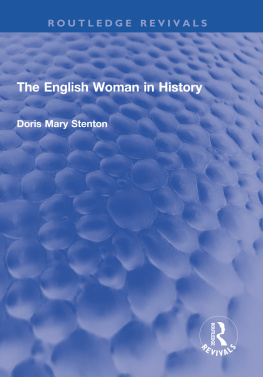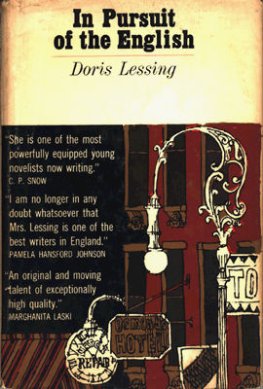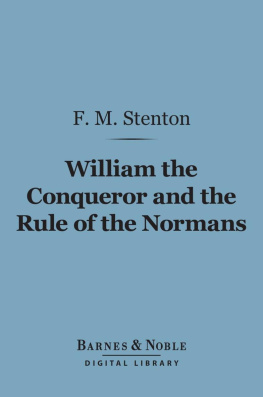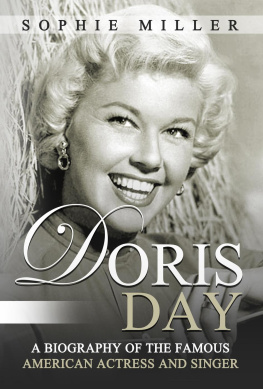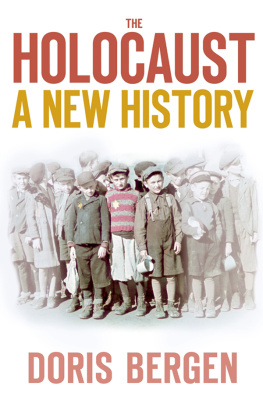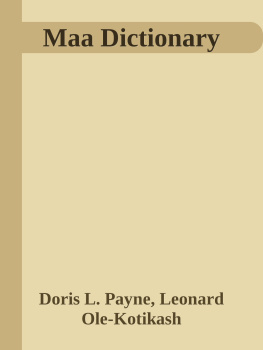Doris Mary Stenton - The English Woman in History
Here you can read online Doris Mary Stenton - The English Woman in History full text of the book (entire story) in english for free. Download pdf and epub, get meaning, cover and reviews about this ebook. year: 1957, publisher: TaylorFrancis, genre: Art. Description of the work, (preface) as well as reviews are available. Best literature library LitArk.com created for fans of good reading and offers a wide selection of genres:
Romance novel
Science fiction
Adventure
Detective
Science
History
Home and family
Prose
Art
Politics
Computer
Non-fiction
Religion
Business
Children
Humor
Choose a favorite category and find really read worthwhile books. Enjoy immersion in the world of imagination, feel the emotions of the characters or learn something new for yourself, make an fascinating discovery.
- Book:The English Woman in History
- Author:
- Publisher:TaylorFrancis
- Genre:
- Year:1957
- Rating:5 / 5
- Favourites:Add to favourites
- Your mark:
- 100
- 1
- 2
- 3
- 4
- 5
The English Woman in History: summary, description and annotation
We offer to read an annotation, description, summary or preface (depends on what the author of the book "The English Woman in History" wrote himself). If you haven't found the necessary information about the book — write in the comments, we will try to find it.
The English Woman in History — read online for free the complete book (whole text) full work
Below is the text of the book, divided by pages. System saving the place of the last page read, allows you to conveniently read the book "The English Woman in History" online for free, without having to search again every time where you left off. Put a bookmark, and you can go to the page where you finished reading at any time.
Font size:
Interval:
Bookmark:

First published in 1957, The English Woman in History displays the place women have held and the influence they have exerted within the changing pattern of English society. Ever since the days of Queen Elizabeth I the position of women in English society has been a matter of general debate. In the seventeenth century many men produced books in praise of women, following the example of Thomas Heywood. Most of these books were devoted to the praises of individual women, but their authors generally produced arguments against subjection of all women to the unthinking dominance of men. While married women were still legally subject to their husbands and no women were allowed to take part in public affairs it was impossible to write objectively about womens place in the world. The women who at the end of the seventeenth century began to write were generally fired by a sense of injustice, and men tended to write condescendingly of charm and beauty, which interested them more than intelligence and wit. Now that women are bearing public responsibilities with success it is possible for historians to look back dispassionately over the centuries and trace the stages by which this position has been won. It is a survey of this nature which Lady Stenton has attempted in this book. This is a must read for students and scholars of womens history, gender studies and womens movement.
Doris Mary Stenton

First published in 1957
by George Allen & Unwin Ltd.
This edition first published in 2022 by Routledge
4 Park Square, Milton Park, Abingdon, Oxon, OX14 4RN
and by Routledge
605 Third Avenue, New York, NY 10017
Routledge is an imprint of the Taylor & Francis Group, an informa business
1957 Doris Mary Stenton
All rights reserved. No part of this book may be reprinted or reproduced or utilised in any form or by any electronic, mechanical, or other means, now known or hereafter invented, including photocopying and recording, or in any information storage or retrieval system, without permission in writing from the publishers.
Publishers Note
The publisher has gone to great lengths to ensure the quality of this reprint but points out that some imperfections in the original copies may be apparent.
Disclaimer
The publisher has made every effort to trace copyright holders and welcomes correspondence from those they have been unable to contact.
A Library of Congress record exists under LCCN: 57013801
ISBN: 978-1-032-22657-6 (hbk)
ISBN: 978-1-003-27360-8 (ebk)
ISBN: 978-1-032-22659-0 (pbk)
Book DOI 10.4324/9781003273608
by
DORIS MARY STENTON


FIRST PUBLISHED IN 1957
This book is copyright under the Berne Convention. Apart from any fair dealing for the purposes of private study, research, criticism or review, as permitted under the Copyright Act, 1911, no portion may be reproduced by any process without written permission. Enquiry should be made to the publishers
PRINTED IN GREAT BRITAIN
in 12-point Bembo type
BY UNWIN BROTHERS LIMITED
WOKING AND LONDON
My purpose in writing this book has been to display the place women have held and the influence they have exerted within the changing pattern of English society from the earliest down to modern times. This book, therefore, can only begin with the famous description of the women of the Germanic tribes written by the Roman historian Tacitus. It ends, save for an occasional excursion, with the publication of The Subjection of Women by John Stuart Mill in 1869. The evidence for more recent generations is so voluminous, and so many studies of individual women of this age have appeared that to carry my survey farther would have thrown the book out of focus. The material from which I have drawn my evidence is contemporary with the people of whom I write in the successive chapters of this book. Contemporary narrative history, the early laws, charters, and wills throw sometimes surprising light on the women of the early period of our history. The records of courts of justice, both the royal courts and those of the manor, grants of land, and wills are invaluable for the Middle Ages, and before they have ended the stream of correspondence has begun. The Paston letters have been a quarry for generations of historians. They are an astonishingly rich and lively source, and for their date they stand almost alone. Nevertheless, as the years pass the material soon becomes embarrassingly ample, and I have been able to use diaries, memoirs, and letters, sermons, and tracts dealing directly or incidentally with my subject.
All the women the reader will meet in these pages were real people who lived and worked in the England of their day. In my search for material I have deliberately avoided the romantic literature of the Middle Ages, coloured as it is throughout by an artificial embellishment of life. Nor have I used the novels of a later period. The active imagination of the novelist produces creatures who seem for a moment to live more vividly than the real people of history, for they are tailored to fit a story, and the inconsistences and contradictions of real life are ironed out. The comments of Lady Mary Wortley Montagu, quoted in this book, upon her contemporary, Samuel Richardson, and his famous Pamela should be read by every historian who is tempted to drive home a point by quoting a character from fiction. The historians own insight may possibly be stimulated by reading the work of novelists contemporary with his period, but he should not draw it into evidence. I have therefore deliberately refrained from citing the phantoms who appear in novels however brilliant the writing or convincing the circumstances may seem.
The period covered by this book is so long and the literature so vast that careful consideration of my plan was necessary. It was obviously impossible to deal on equal terms with every female activity, nor were they all equally relevant to my design. I had no desire to set out an orderly catalogue of female excellence. In particular, there seemed little that I could say with advantage about women artists or writers of plays, poems, or novels, or about actresses. Since the days of Aphra Behn women have shone in increasing numbers as imaginative writers. Between the birth of Aphra Behn in 1640 and the death of Eliza Haywood in 1756 the female novelist was forged. Aphra Behn, Mrs. Manley, and Mrs. Haywood, who belonged to three successive generations, established a lasting tradition. None of them, so far as I know, has left a diary behind her. Other women of parts, who might have been cited, have doubtless been overlooked because their works do not happen to have come my way. I have only recently been introduced by Professor Bruce Dickins to Agnes Beaumont, a slightly younger contemporary of Aphra Behn, whose brief story of the troubles which fell on her because she insisted on riding pillion behind John Bunyan to a religious meeting at Gamlingay is an astonishingly vivid piece of natural writing by the daughter of a small farmer, who lived in a two-roomed cottage and spent most of his time serving the cows. Agnes Beaumont is relevant to my argument because the capacity of a farmers daughter to make an exciting story out of her own experiences is another proof of my contention that the education of girls in the seventeenth century was not always as ineffective as some writers seem to believe.
Font size:
Interval:
Bookmark:
Similar books «The English Woman in History»
Look at similar books to The English Woman in History. We have selected literature similar in name and meaning in the hope of providing readers with more options to find new, interesting, not yet read works.
Discussion, reviews of the book The English Woman in History and just readers' own opinions. Leave your comments, write what you think about the work, its meaning or the main characters. Specify what exactly you liked and what you didn't like, and why you think so.

